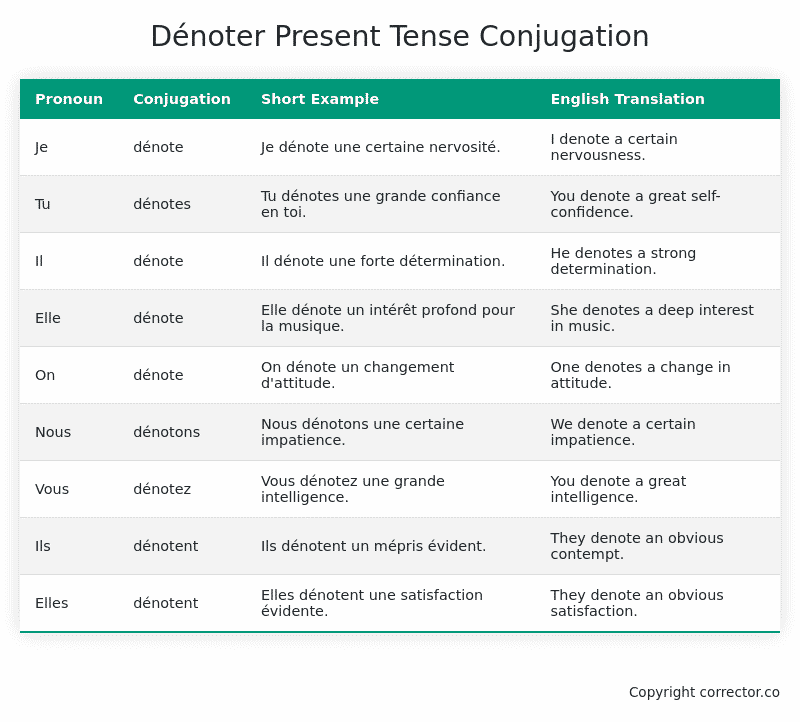Le Present (Present Tense) Conjugation of the French Verb dénoter
Introduction to the verb dénoter
The English translation of the French verb dénoter is “to denote.” The infinitive form of dénoter is pronounced as “de-no-te.”
Dénoter originated from the Latin word “denotare,” which means “to mark out.” In everyday French, dénoter is commonly used to express the idea of indicating, revealing, or showing something through signs or characteristics.
Examples:
- Son attitude dénote une grande confiance en soi. (His attitude denotes great self-confidence.)
- Les critiques négatives dénotent un manque d’appréciation pour son travail. (Negative reviews denote a lack of appreciation for his work.)
- Le sourire de la mariée dénote son bonheur. (The bride’s smile denotes her happiness.)
Dénoter – About the French Present Tense
To take a deep dive into all the French tenses then see our article on Mastering French Tense Conjugation.
Common Everyday Usage Patterns For Le Present
Interactions with Other Tenses
Table of the Present Tense Conjugation of dénoter
| Pronoun | Conjugation | Short Example | English Translation |
|---|---|---|---|
| Je | dénote | Je dénote une certaine nervosité. | I denote a certain nervousness. |
| Tu | dénotes | Tu dénotes une grande confiance en toi. | You denote a great self-confidence. |
| Il | dénote | Il dénote une forte détermination. | He denotes a strong determination. |
| Elle | dénote | Elle dénote un intérêt profond pour la musique. | She denotes a deep interest in music. |
| On | dénote | On dénote un changement d’attitude. | One denotes a change in attitude. |
| Nous | dénotons | Nous dénotons une certaine impatience. | We denote a certain impatience. |
| Vous | dénotez | Vous dénotez une grande intelligence. | You denote a great intelligence. |
| Ils | dénotent | Ils dénotent un mépris évident. | They denote an obvious contempt. |
| Elles | dénotent | Elles dénotent une satisfaction évidente. | They denote an obvious satisfaction. |
Other Conjugations for Dénoter.
Le Present (Present Tense) Conjugation of the French Verb dénoter (You’re reading it right now!)
Imparfait (Imperfect) Tense Conjugation of the French Verb dénoter
Passé Simple (Simple Past) Tense Conjugation of the French Verb dénoter
Passé Composé (Present Perfect) Tense Conjugation of the French Verb dénoter
Futur Simple (Simple Future) Tense Conjugation of the French Verb dénoter
Futur Proche (Near Future) Tense Conjugation of the French Verb dénoter
Plus-que-parfait (Pluperfect) Tense Conjugation of the French Verb dénoter
Passé Antérieur (Past Anterior) Tense Conjugation of the French Verb dénoter
Futur Antérieur (Future Anterior) Tense Conjugation of the French Verb dénoter
Subjonctif Présent (Subjunctive Present) Tense Conjugation of the French Verb dénoter
Subjonctif Passé (Subjunctive Past) Tense Conjugation of the French Verb dénoter
Subjonctif Imparfait (Subjunctive Imperfect) Tense Conjugation of the French Verb dénoter
Subjonctif Plus-que-parfait (Subjunctive Pluperfect) Tense Conjugation of the French Verb dénoter
Conditionnel Présent (Conditional Present) Tense Conjugation of the French Verb dénoter
Conditionnel Passé (Conditional Past) Tense Conjugation of the French Verb dénoter
Conditionnel Passé II (Conditional Past II) Tense Conjugation of the French Verb dénoter
L’impératif Présent (Imperative Present) Tense Conjugation of the French Verb dénoter
L’impératif Passé (Imperative Past) Tense Conjugation of the French Verb dénoter
L’infinitif Présent (Infinitive Present) Tense Conjugation of the French Verb dénoter
L’infinitif Passé (Infinitive Past) Tense Conjugation of the French Verb dénoter
Le Participe Présent (Present Participle) Tense Conjugation of the French Verb dénoter
Le Participe Passé (Past Participle) Tense Conjugation of the French Verb dénoter
Struggling with French verbs or the language in general? Why not use our free French Grammar Checker – no registration required!
Get a FREE Download Study Sheet of this Conjugation 🔥
Simply right click the image below, click “save image” and get your free reference for the dénoter present tense conjugation!

I hope you enjoyed this article on the verb dénoter. Still in a learning mood? Check out another TOTALLY random French verb present conjugation!


